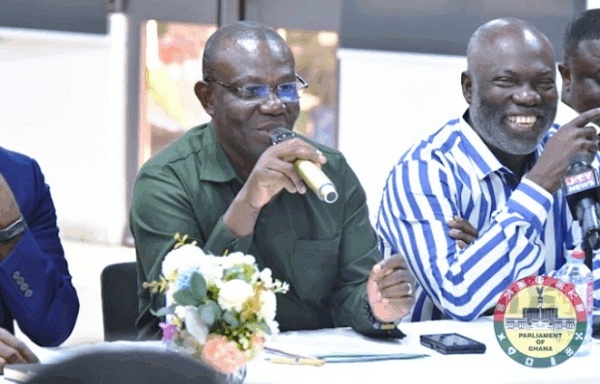The Chairman of Parliament’s Select Committee on Energy, Emmanuel Kwasi Bedzrah, has said the House will not approve any electricity tariff increases until power sector agencies demonstrate significant improvements in revenue collection and operational efficiency.
Speaking to journalists after a monitoring visit to the Ghana Grid Company Limited (GRIDCo), the Energy Commission, and the Public Utilities Regulatory Commission (PURC), the Ho West MP stressed that tariff hikes must be justified with evidence, not external pressure.
Mr. Bedzrah noted that widespread commercial losses remain a major concern, citing meters distributed in rural areas that have not yet been captured in the national grid for billing.
“If you add up all those meters into the collection of the revenue as tariff, I believe that we will not get to that 225 percent that we’re looking at,” he said. He further pointed to illegal power connections and weak internal collection systems as major leakages.
“We think that it is high time now they begin to look at how much they collect and how they can collect the revenues that are due to them,” he added, stressing that any call for higher tariffs must be preceded by concrete measures to plug these gaps.
While acknowledging the need for new investments in the sector, Mr. Bedzrah questioned why Ghana already pays the highest electricity tariffs in the sub-region, despite exporting power to neighbouring countries such as Benin.
He also raised alarms over illegal mining (galamsey) undermining electricity infrastructure, warning that excavation around high-voltage pylons could lead to fatal accidents and nationwide blackouts.
The committee plans to present a comprehensive report to Parliament for debate, which will guide any decision on the upcoming multi-year tariff review.
“We are the representatives of the people. We cannot sit down for any rate to be bundled at us. We need to know what exactly it entails and if we are going to be in the same alignment or the same price range with our neighbours,” Mr. Bedzrah affirmed.
GRIDCo’s Deputy Chief Executive for Engineering and Operations, Frank Okyere, outlined plans to enhance power transmission through the $353.65 million Eastern Corridor Project. The initiative will expand and upgrade substations and construct new transmission lines across the Volta, Bono East, Oti, Savannah, and Northern Regions.
He explained that feasibility studies, environmental and social impact assessments, and resettlement compensation are currently underway, with construction expected to begin in 2027. He urged expedited financial clearance under the Public Financial Management Act to fast-track the project and highlighted threats from illegal mining and encroachment, stressing proactive planning for renewable energy integration.
At the Energy Commission, Executive Secretary Eunice A. Biritwum said Ghana was steadily advancing its energy transition, despite the 2070 target being ambitious. She highlighted ongoing solar, wind, and hybrid projects, including VRA’s wind-solar initiatives and the 12,000-installation scheme with battery storage. She called for stronger support for local industries to drive renewable energy growth and sustainability.
The Executive Secretary of PURC, Dr. Shafic Suleman, told the Committee that his outfit had tightened oversight of power-sector revenues through the cash waterfall mechanism and the consolidation of ECG’s 80 accounts into a single holding account.
He identified the absence of a regulatory framework for clean drinking water as a major national gap, urging lawmakers to pass a Clean Water Act. He also outlined ongoing tariff reviews, clarified that IMF requirements do not mandate automatic increases, and highlighted challenges with streetlight maintenance, industrial gas subsidies, and the need for stronger stakeholder engagement nationwide.
Graphic





